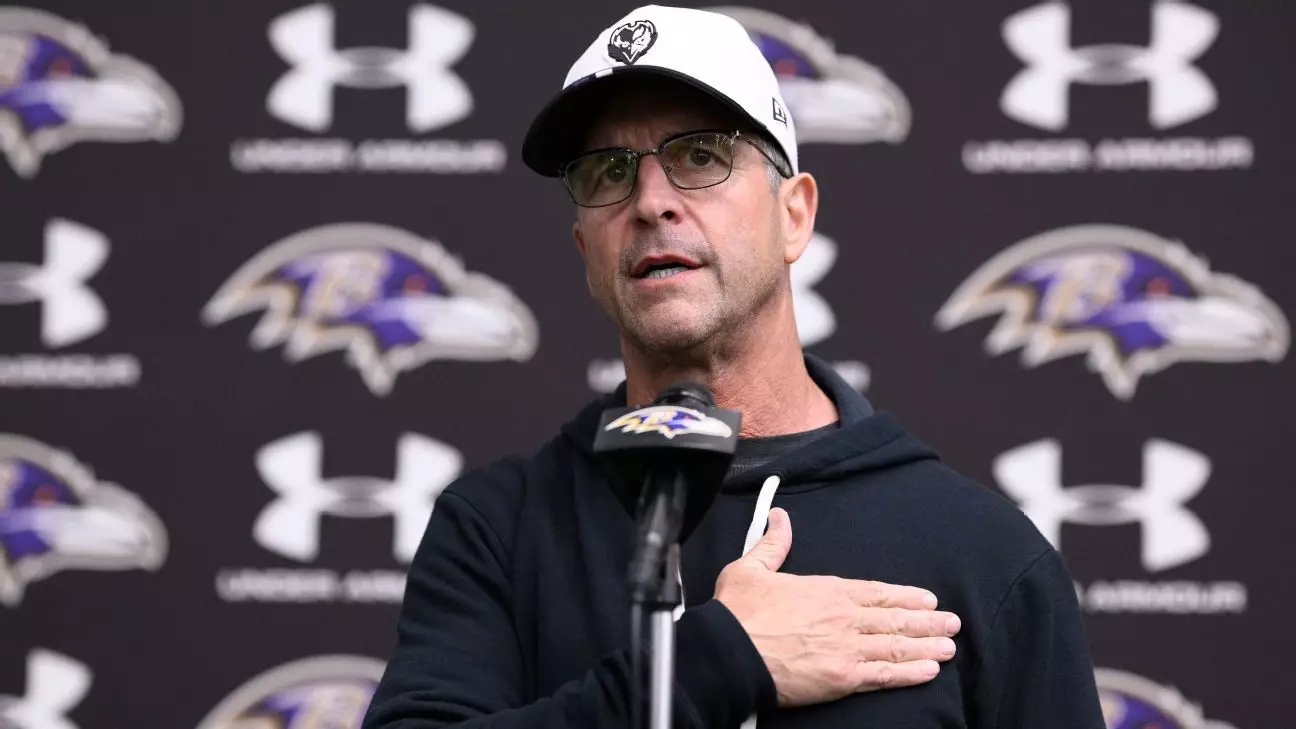In a moment fraught with controversy, Baltimore Ravens coach John Harbaugh unpacked the intricacies of the franchise’s decision to release Justin Tucker, the NFL’s highest-accuracy kicker, amid serious allegations of sexual misconduct. This ruling was steeped in a multifaceted decision-making process, where key figures like owner Steve Bisciotti, team president Sashi Brown, and general manager Eric DeCosta converged to evaluate Tucker’s status with the team. “It was a complex decision-making process,” Harbaugh comments, aptly summing up the tension that looms over such a significant move. This particular situation is much more than numbers; it’s about the stability and integrity of a franchise.
Releasing a player like Tucker might seem rash on the surface, especially for a player of his caliber, but the realities of professional sports demand that teams weigh the impact of a player’s off-field issues against their on-field productivity. The Ravens seemingly opted to prioritize the preparation of their team for the upcoming season over maintaining ties to a player, who, despite his unprecedented accuracy, found himself entangled in a web of serious allegations.
The Weight of Allegations
Justin Tucker’s reputation is now overshadowed by accusations from sixteen different massage therapists, all alleging misconduct that dates back to his early NFL years. While Tucker vehemently denies these claims, categorizing them as “unequivocally false” and dismissing the reports as “desperate tabloid fodder,” the existence of such allegations inevitably complicates his relationship with the Ravens. No organization wants to be associated with any form of misconduct, particularly when it involves multiple parties and the potential for legal ramifications.
Harbaugh’s insistence on viewing this as a “football decision” brings to light the harsh reality that personal scandals can bleed into the professional realm, creating a hypersensitive atmosphere where teams must act swiftly to protect their brand. The Ravens initially indicated they would wait for the NFL’s investigation to conclude before making a judgment, but their rapid pivot underscores the urgency felt within the organization to maintain their reputation. Thus, the decision was made to part ways before a resolution was reached, indicating the franchise’s intolerance for controversy.
A Shift in Strategy
In the aftermath of Tucker’s release, the Ravens now shift their focus toward a collegiate-style competition for the kicking position, featuring rookie Tyler Loop, their sixth-round draft choice, and undrafted newcomer John Hoyland. It’s worth noting that this is a similar play to 2012 when the Ravens opted to use an untested Tucker, who went on to become a franchise legend. The question arises: can history repeat itself, or is the risk too immense for a team vying for a championship?
Harbaugh acknowledges the inherent uncertainties associated with relying on a rookie kicker in high-pressure scenarios. “There’s a lot of risks in life,” he wisely states, indicating the broader theme of risk management not just in football but in life. Navigating a championship-caliber team through the waters of rookie talent is a struggle; a decision rendered more complicated when the specter of a scandal looms overhead. Bracing for what lies ahead, the Ravens displayed courage—even if tempered with caution—in their decision to foster new talent in a high-stakes environment.
The Future of Kicking with the Ravens
With Tucker’s departure, there remains a palpable gap in experience and proven performance. His last season was a notable downturn, with a missed kick rate significantly higher than previous seasons. But even the best can struggle; if there was any time to revitalize the kicking strategy, it is now for the Ravens. As they usher in a new era following Tucker’s exit, Baltimore might very well find their next franchise kicker in this newly developed competition.
The departure does not merely reflect the abandonment of a talent but opens the door to potential growth. The NFL is replete with stories where new faces have stepped up when it was most needed, suggesting that while Tucker won’t be easily forgotten, the Ravens must forge ahead. The onus now lies on Loop and Hoyland to seize this opportunity and prove that they can deliver when the game is on the line.
In taking such definitive action, the Ravens are not merely reacting to the turmoil surrounding Tucker; they are declaring their commitment to integrity and a forward-looking mindset, determined to navigate through adversity and craft a squad that’s resilient enough for the challenges that lie in wait.

